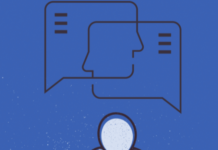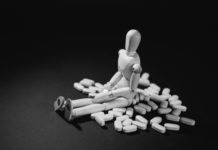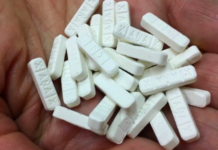The Female Subject in Psychiatry From Pathology to Prozac
In this piece for The New Inquiry, Sophie Putka chronicles the mental health profession's long history of pathologizing, diagnosing, and medicating women's emotions.
"With Freud’s claims...
Chris Cornell’s Wife Blames Anxiety Medicine for Suicide
From Rolling Stone: On Thursday morning, singer Chris Cornell died by suicide. His wife recently issued a statement speculating that his suicide may have been...
Benzodiazepine Withdrawal Symptoms
Members of the group Benzodiazepine Recovery have created a video about the often debilitating symptoms of benzodiazepine withdrawal.
Video →
Benzodiazepine Use of 50% of Elderly Patients is Not Monitored
The American Psychiatric Association (APA) publication Psychiatric News has released an article about the recent British Medical Journal study finding strong links between long-term...
Air Pollution Linked to Mental Health Problems in Children
A new study, published in BMJ Open-Access this week, found a significant link between the level of air pollution in a community and the mental health of the children living there. After controlling for socio-economic status and other potential variables, researchers in Sweden discovered a strong association between the concentration of air pollution in a neighborhood and the amount of ‘antipsychotic’ and psychiatric drugs prescribed to children. The link remained strong even at pollution levels well below half of what is considered acceptable by the World Health Organization (WHO).
Vegas Shooter was Reportedly Prescribed Anti-Anxiety Meds
From the New York Post: Mass murderer Stephen Paddock was reportedly prescribed anti-anxiety medication this past summer. The gunman purchased 50 10-milligram tablets of Valium...
Online Communities for Drug Withdrawal: What Can We Learn?
From Psychiatric Times: Patients are increasingly turning to the internet as a source of information and support for antidepressant and benzodiazepine withdrawal due to the psychiatric...
The REST Project Support Service for Benzo and Sleeping Tablet Dependence: My Story
As a service user of the REST project at Mind in Camden, I want to celebrate World Benzodiazepine Day 2018 by telling the world a little bit about what REST has done for me. I’m now 18 months off benzos, but I still attend REST regularly to process the anger and grief I feel about what I went through, and to support those who are still tapering.
The Reckoning in Psychiatry Over Protracted Antidepressant Withdrawal
Medically-induced harm—affecting tens of millions of people worldwide—has taken the field decades to take seriously.
The Blame Game
It’s hard not to be enraged when your life is in shambles, you want nothing more than to get it back (and it’s happening barely, slowly, if at all), and you feel betrayed by the very people who you thought, at least at one point, meant to help you.
Don’t Harm Them Twice: When the Language Surrounding Benzodiazepines Adds Insult to Injury (Part...
Language is important. And when language dictates specific treatment protocols, it should be used with extreme scrutiny. Using the wrong words can put vulnerable people at risk—not only to their sense of self-worth, their sense of self-knowledge, and they way they are treated, but also to their health.
SSRIs and Benzodiazepines Associated with Problems in Infants
Infants exposed to SSRIs and benzodiazepines during pregnancy show impaired neurologic functioning in the first month after birth, according to a new study published in the American Journal of Psychiatry. While infants exposed SSRIs alone showed neurobehavioral effects throughout the first month, those exposed to an SSRI and a benzodiazepine had more significant problems.
Doctors Rarely Warn about Benzo Withdrawal
The Boston Globe interviews people who became ever more severely dependent on sedating benzodiazepines without realizing it, because as they tried to stop taking...
VA Still Using Benzos for PTSD Despite Warnings
Military.com reports that doctors from the Department of Veterans' Affairs are continuing to prescribe tranquilizers such as Valium and Xanax despite the VA's guidelines...
Tapering Strips for Benzodiazepines
One size fits all does not work. It is not possible to use the same tapering schedule for all patients who wish to stop with a certain drug. Therefore we had to come up with a flexible solution that was both practical and allowed doctors and patients to make the choice they deemed appropriate.
Slew of New Studies Spot Links Between Psychiatric Medications and Bone Loss, Fractures
Four different studies conducted in different ways examining different groups have linked use of certain psychiatric drugs to bone fracture risks and negative impacts on human bone development.
Sweeping Benzos Under the Carpet
Being an ex-accountant I am always interested in figures (not to mention that prescribed benzodiazepine drug addiction has played such a major part in my life). According to a yearly booklet released by the Home Office in the UK, benzodiazepine drugs accounted for more deaths than ALL the so-called hard drugs put together.
Psychiatric Drug Ads Lead to More Prescriptions and Worse Treatment
A new analysis published in the The Journal of Clinical Psychiatry investigates the public health effects of direct-to-consumer advertisements for psychiatric drugs. The researchers...
Benzo Rx Increasing Dramatically in U.S., Often With Opiods
Research presented at the annual meeting of the American Academy of Pain Medicine finds that 12.6% of primary care visits in the U.S. involved...
Benzo Withdrawal: Why Don’t Doctors Know?
Many have asked: “Why doesn’t my doctor/provider know what is happening to me?” Benzodiazepine tolerance and withdrawal are not new. So, why isn’t it simple to diagnose and treat? As both a health care provider and a withdrawal sufferer, I’d like to offer an inside and outside perspective on this question.
Xanax: Children As Young As 11 Taking Anxiety Drug
From BBC: The abuse of the anti-anxiety drug Xanax is becoming widespread among children and adolescents as young as 11 years old.
"To gain an idea of the...
Anxiety Medication Associated With Significant Increase in Mortality Long-Term
A study of data from over 11 million patient records in the General Practice Research Database, "the largest anonymized, longitudinal primary care database in...
German Psychologists Declare “the Drugs Don’t Work”
Jürgen Margraf and Silvia Schneider, both well-known psychologists at the University of Bochum in Germany, claim that psychotropic drugs are no solution to mental...
Petition Calls on Pharma Companies to Offer Tapering Kits for Depression and Anxiety Drugs
A change.org petition out of the United Kingdom is addressing the extreme difficulty faced by people who attempt to taper off of antidepressants and...
“One Nation, Under Sedation”
-In 2013 when Medicare officially started paying for anti-anxiety drugs, more than 40 million prescriptions worth more than $377 million were doled out.





















